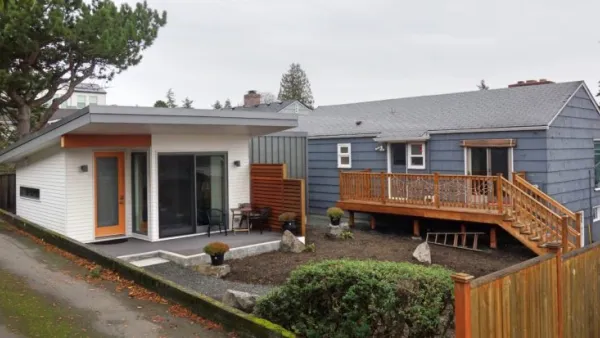Using homeownership as an asset-building mechanism and retirement plan might not be a great thing for our society.

Robert Wassmer and Imaez Wahid set off a bit of a firestorm several months ago with an ill-considered article in Housing Policy Debate that asked whether NIMBYism might actually be “rational” in a world where “likely residents of affordable housing” might actually lower property values. In other words, if the world discriminates, it becomes rational for supposedly non-biased homeowners to do so as well, since other people’s beliefs will affect their property values.
I’m not going to get into a thorough debunking of their argument and policy proposal, because three published responses do the job quite thoroughly: “Comment on ‘Does the Likely Demographics of Affordable Housing Justify NIMBYism?’” by J. Rosie Tighe and Edward G. Goetz; “Affordable Housing and Its Residents Are Not Pollutants,” by Mai Thi Nguyen and Corianne Payton Scally; and, for the scholars, “A Methodological Critique of Wassmer and Wahid,” by Philip M. E. Garboden and Prentiss A. Dantzler. They are currently free to download, but that might be temporary.
The extremely short version is:
- If you don’t carefully or accurately define “affordable housing” or the demographics of who lives in it, then you can’t measure its effect on home prices. (Oh, and you ignored a ton of literature that says it doesn’t have an effect.)
- If you ignore the history behind discriminatory land use and credit policies, you will misinterpret the reason for lower home prices in areas with certain demographics and therefore inaccurately predict how current changes in demographics will affect other areas.
- Using language that gives any credence to inaccurate associations between, for example, crime and affordable housing, is incredibly harmful, even in theory.
(You can also see Wassmer’s response to the feedback here.)
One thing that struck me about this whole kerfuffle, though, is that it’s a good example of why using homeownership as an asset-building mechanism and retirement plan might not be a great thing for our society.
FULL STORY: Time to Delink Homeownership from Asset Building

Planetizen Federal Action Tracker
A weekly monitor of how Trump’s orders and actions are impacting planners and planning in America.

San Francisco's School District Spent $105M To Build Affordable Housing for Teachers — And That's Just the Beginning
SFUSD joins a growing list of school districts using their land holdings to address housing affordability challenges faced by their own employees.

The Tiny, Adorable $7,000 Car Turning Japan Onto EVs
The single seat Mibot charges from a regular plug as quickly as an iPad, and is about half the price of an average EV.

San Diego Votes to Rein in “Towering” ADUs
City council voted to limit the number of units in accessory buildings to six — after confronting backyard developments of up to 100 units behind a single family home.

Texas Legislature’s Surprising Pro-Housing Swing
Smaller homes on smaller lots, office to apartment conversions, and 40% less say for NIMBYs, vote state lawmakers.

Even Edmonton Wants Single Staircase Buildings
Canada's second most affordable major city joins those angling to nix the requirement for two staircases in multi-family buildings.
Urban Design for Planners 1: Software Tools
This six-course series explores essential urban design concepts using open source software and equips planners with the tools they need to participate fully in the urban design process.
Planning for Universal Design
Learn the tools for implementing Universal Design in planning regulations.
Borough of Carlisle
Smith Gee Studio
City of Camden Redevelopment Agency
City of Astoria
Transportation Research & Education Center (TREC) at Portland State University
City of Camden Redevelopment Agency
Municipality of Princeton (NJ)





























